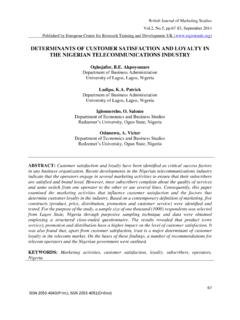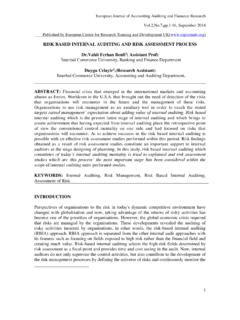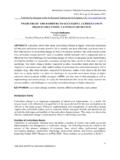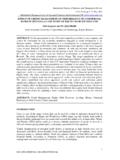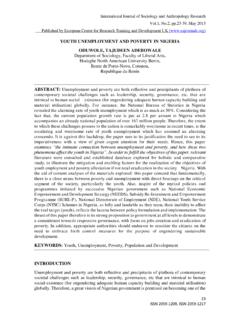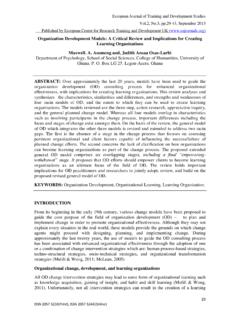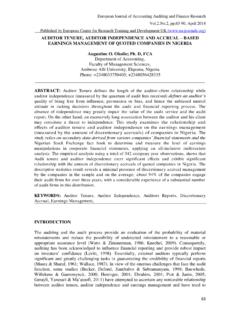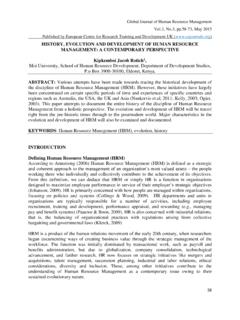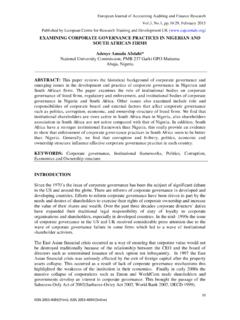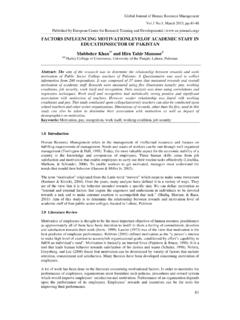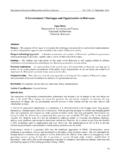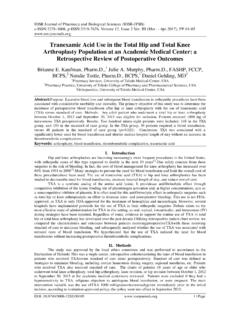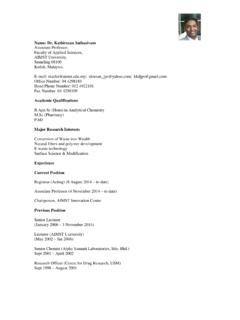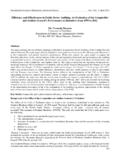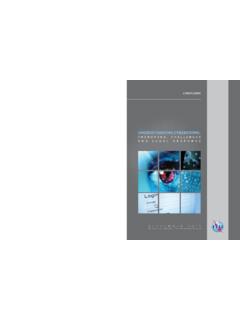Transcription of Religion and Morality in Ghana - EA Journals
1 Global journal of Arts Humanities and Social Sciences , , , september 2013 Published by European Centre for Research Training and Development UK ( ) 162 Religion and Morality in Ghana : A Reflection George Anderson Jnr. (M. Phil.)1 Department of Religion and Human Values, University of Cape Coast, University Post Office Cape Coast, Ghana , West Africa. Email: +233 208696200 ABSTRACT: Several scholars have written extensively on Religion and Morality . These works generally try to answer the question of what determines Morality .
2 Whiles some scholars strongly maintain that Religion is the determinant of Morality , some are sceptical and others do not accept such stance. Such discourse has found its way into African ethics with views from the west and among some Africans who maintain that the Morality of Africans is religious base. With these arguments on board, some prolific Ghanaian writers have argued that whether or not Religion determines the Morality of Africans, in Ghana however, among the Akan, it is the society and the traditions that determine the Morality of its members but not Religion .
3 This paper joins the debate to bring to the fore that it is not the society and traditions that determine the Morality of the Akan and Ghanaians in general. The paper argues that the Akan and the Ghanaian society thrive on Religion and almost all the traditions instituted have religious imports. For these reasons, the paper concludes that Religion is the determinant of the Morality of Ghanaians including the Akan but not society and traditions. KEYWORDS: Ghanaian, Morality , Religion .
4 INTRODUCTION Over the years, several scholars have raised arguments concerning what determines the Morality of a group of people. Whereas some scholars are optimistic about the fact that it is Religion , others maintain that it is the society and the peoples traditions. In Ghana , some prolific scholars have joined this debate. They have argued that whereas Religion plays a role in determining the Morality of the Akan2 people of Ghana , they maintain that it is rather society and the people s traditions.
5 By joining the debate however, I am of the view that almost all Ghanaian traditional societies including the Akan societies thrive on religion3. Secondly, almost all the traditions found in the Ghanaian culture have religious imports. In this paper, I will revisit and review some of the arguments on what determines Morality and then draw my conclusion. 1 George Anderson Jnr. is a Senior Research Assistant in the area of Ethics and Society in the Department of Religion and Human Values, University of Cape Coast, Ghana .
6 2 Appiah-Sekyere, P. & Awuah-Nyamekye, S. (2012). Teenage pregnancy in the life and thought of the Akan: Moral perspectives. Sociology Study, Vol. 2, No. 2, p. 129. 3 By Religion , I mean the decrees and sanctions of the Supreme Being (God or Allah), lesser gods and spirits beings. Global journal of Arts Humanities and Social Sciences , , , september 2013 Published by European Centre for Research Training and Development UK ( ) 163 What is Religion ? The word Religion is derived from the Latin word religio, which means to bind together.
7 4 Over the centuries, influential thinkers have offered their own definitions on the term Religion . However, virtually all of such definitions have been found wanting. In some cases, the definitions are too narrow or too broad. In other cases, the definitions are so vague and inclusive that they do not sufficiently delimit Religion from other areas of human thought such as psychology, law, economics and physics, etc. However, in this paper I will consider just few of the definitions.
8 Some Definitions of Religion In an attempt to explain what Religion is, I will consider the definitions by; Clifford Geertz (1973), Durkheim (1915), Hestings James (1952) and Karl Marx (1844). Clifford Geertz (1973) defines Religion as a system of symbols which act to establish powerful, pervasive and long-lasting moods and motivations in men by formulating conceptions of a general order of existence and clothing these conceptions with such an aura of factuality that the moods and motivations seem uniquely realistic.
9 5 Adding to Geertz (1973), Durkheim (1915) defines Religion as a unified system of beliefs and practices relative to sacred things, that is to say, things set aside and forbidden beliefs and practices which unite into one single moral community called a Church, all those who adhere to them .6 Hestings (1952) says, the term Religion , clearly refers to certain characteristic types of data, a belief, practice, feelings, moods and attitudes, etc .7 For Karl Marx (1844), Religion is the sigh of the oppressed creature, the heart of a heartless world, and the soul of soulless conditions.
10 It is the opium of the However, for me, Religion is an embodiment of beliefs, practices and one s attachment to something considered worthwhile in one s life. These beliefs and practices may include; belief in preternatural forces ( Supreme Being, divinities, lesser gods, angels etc.) and making libation, prayers, burning incense, bowing etc. respectively. With one s attachment to something considered worthwhile, I am referring to what a person have delight in and spends much time and attention on.
